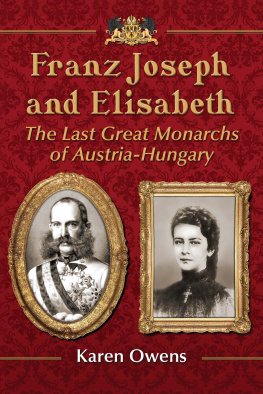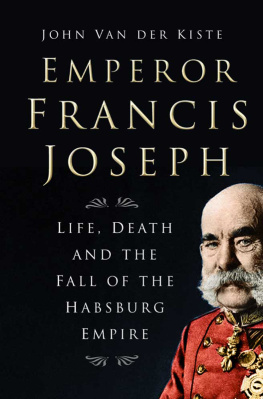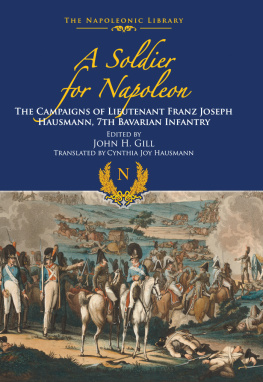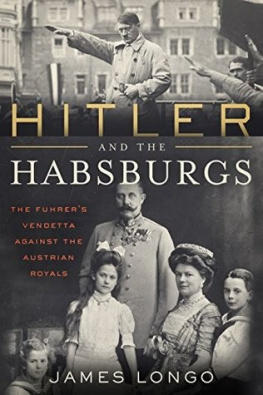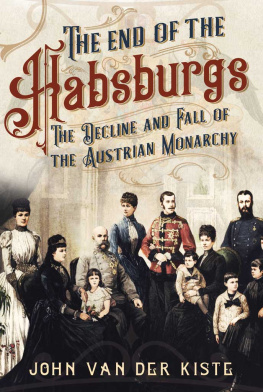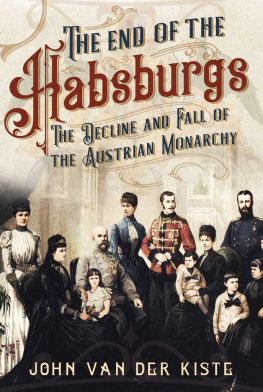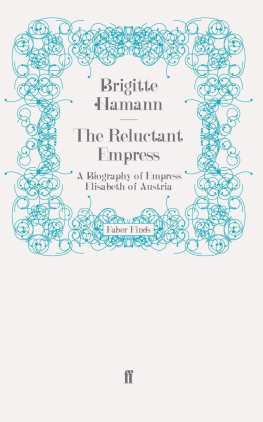
Franz Joseph and Elisabeth
The Last Great Monarchs of Austria-Hungary

KAREN OWENS

McFarland & Company, Inc., Publishers
Jefferson, North Carolina, and London
LIBRARY OF CONGRESS CATALOGUING DATA ARE AVAILABLE
BRITISH LIBRARY CATALOGUING DATA ARE AVAILABLE
e-ISBN: 978-1-4766-1216-4
2014 Karen Owens. All rights reserved
No part of this book may be reproduced or transmitted in any form or by any means, electronic or mechanical, including photocopying or recording, or by any information storage and retrieval system, without permission in writing from the publisher.
On the cover: Emperor Franz Joseph I of Austria, detail of a print for the Vienna worlds fair, 1873 (Library of Congress); Empress Elisabeth of Austria, ca. 19101915 (Library of Congress); Habsburg coat of arms
McFarland & Company, Inc., Publishers
Box 611, Jefferson, North Carolina 28640
www.mcfarlandpub.com
To the Owens family:
Eric Christopher Owens
Gordon Owens
Meade Owens
Caitlin Meade Owens
Karen Parker Owens
With special thanks to
Karen Parkers parents,
Gordon and Meade,
for the wonderful namesake honor
Preface
The reign of Franz Joseph represents an age of imperialism, liberalism and nationalism. Franz Joseph used his sovereignty as emperor of the most powerful country, Austria, and the most commanding dynasty, the Habsburg, to control or influence less powerful countries. Imperialism has been a common practice throughout the history of this world and his rule characterizes a time when monarchs extended their power and dominion through direct territorial acquisition or through politically astute marriages and by uniting the separate governments of the autonomous regions within their borders for the purpose of securing a single state. Over the course of Franz Josephs reign, imperialism fueled liberal thinking and nationalist fervor. Italy and Germany, both of which were heterogeneous patchworks of independent states and principalities, and the Habsburg lands, such as Hungary and Bohemia, all had a desire to exert their greatness on the European global scene. Liberal ideas and nationalism led to the struggles of these Habsburg satellite nations searching for freedom and of Habsburg policies made to preserve the dynasty. When liberal ideas emerged, revolution, or at least an attempt at revolution, was inevitable and the Habsburg dynasty could not escape this trajectory.
Using these seditious times as a backdrop for this work, I explore the equally provocative lives of Franz Joseph and Elisabeth. What follows, then, is a biography: portraits of two people, both holding absolute convictionsone for the Habsburg dynasty and Austria and one for individual recognition and self-realization. Franz Joseph ruled for nearly 68 years, but there is more to Franz Joseph than the longevity of serving as the monarch of the powerful Habsburg dynasty. Myriad images reflect Emperor Franz. Some historians have labeled him an imperialist tyrant who denied freedom to the nations of his empireone who maintained the German hegemony at the expense of the Slavs. He was seen as shy and inhibited, one who felt more comfortable when surrounded by paperwork than when surrounded by society at large. Even as a young boy, Franz was already old-fashioned and later in life deigned modernity in personal preferences and in the government he ran. Throughout his reign, Franz Joseph stuck with what he knew best: the sacredness of divine rulers, great-power politics, military pomp and parades. His motto was Viribus Unitis (with united strength) and that imperial motto helped Franz Joseph save the Habsburg dynasty during the revolutions that rocked the dynasty to its core.
Empress Elisabeth also has many images but one seems to be paramount: her never-ending attempts to receive recognition. Her first attempt was to be outstandingly beautiful, and, while nature endowed her with spectacular beauty, she would spend endless hours in perfecting that beauty. She tried to obtain recognition as a sportswoman and spent untold hours training to become a woman of unparalleled equestrian skills. Elisabeth tried to find posthumous fame in her poetry using Heinrich Heine as her revered model. Each of these pursuits, however, would elude the recognition she sought or would wane as time passed. Elisabeth was blessed with Helen of Troy looks and cursed with a Cassandra complex. Her life at court was one of rejection, for her blood was deemed by the proper court to be an improper hue of blue. She abhorred ceremony and excoriated the excesses of aristocratic systemsjust like the unfortunate Queen Marie Antoinette.
What follows is history, an overview of the events that immediately preceded, and those that occurred during, the reign of Franz Joseph (18481916). Franz, along with the heads of other European countries and dynasties, was not attuned to the growing wave of discontent. Subsequently the history of the mid1800 and early 1900s is a history of the upheavals that occurred throughout all of Central Europe as the laboring classes fought against their imperial occupiers. It is a history of Austrias dominating prime ministerMetternichand of Austrias conquerorsNapoleon and Bismarckand of revolutions and compromises and the war to end all wars.
What follows is the story of the Habsburgs. Franz Joseph and Elisabeth presided over the most strict and pompous court in all of Europe and reigned over a society with strong caste hierarchiesthe haves and the have nots. Imperialism here refers to the subjugation of the proletariat class. In the ninth century, for example, under the first Habsburg emperor, Charlemagne, the Slavs were worked to death in his mines. So frequent and prolonged was the enslavement of Eastern Europeans that Slav became synonymous with servitude. Indeed, the word slave derives from Slav. Thus, a major thread woven within the cultural fabric of the 1800s was the imperialistic belief that monarchs, kings, and emperors were superior to the masses. They gave themselves deity-like status and saw themselves as rulers by divine right. For centuries the masses believed in the inherent sacredness of sovereign power. Their rule was absolute over their subjects, who were deemed incapable of ruling themselves. Franz believed, was conditioned to believe, that all men were created unequal. It never occurred to him that he should try to be more accommodating to his subjects and to listen to their needs. Nor did he ever do anything to attract their affection. Franz did not crave popularity from the common people. Most monarchs simply thought it undignified or beneath them to curry favor with the masses. Franz Josephs wife, the Empress Elisabeth, learned to think in similar ways and led a self-serving life that placed her above those of lesser status. Those with royal, aristocratic blood were above common man and common man was not among their concerns. This thinking proved disastrous.
What follows is Vienna. When one speaks of 1800 Vienna, its hard not to conjure pictures of royalty in their imperial finery, castles with gold-leaf embellishments, melodic waltzes, all capturing the romanticism of a glittery bygone era. Vienna speaks of famous namesEmpress Maria Theresa, Emperor Franz Joseph, Empress Elisabeth, Mozart, Hayden, King Ludwig IIof breathtaking structuresSchnbrunn, Hofburg Palace, St. Stephens Cathedral and castles with nearly unpronounceable names on barely accessible mountain heightsHohenschwangau, Herrenchiemsee, Neuschwansteinof majestic music, with Strauss
Next page
